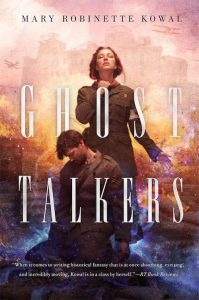
Ghost Talkers by Mary Robinette Kowal
Genre: Historical Fantasy
Publisher: Tor Books on August 16, 2016
Source: Netgalley
![]()
![]()
![]()
![]()
My thanks to the publisher for providing me with a digital review copy. No compensation was provided for this review, and all opinions are my own.
Ginger Stuyvesant, an American heiress living in London during World War I, is engaged to Captain Benjamin Harford, an intelligence officer. Ginger is a medium for the Spirit Corps, a special Spiritualist force. View Spoiler »
![]()
![]()
Ginger Stuyvesant faces many obstacles to her participation in the WWI Allied war effort, including her gender, her American heritage, and the top-secret nature of her contribution. As a member of the Spirit Corps, a cadre of spirit mediums, Ginger channels the spirits of fallen soldiers to share in their last moments to unearth information about the German’s plans. Although this work is a crucial component of the British war effort, it goes largely unrecognized and takes a terrible toll on the mediums that must live through the traumatic deaths of hundreds of soldiers.
As if that weren’t draining enough, Ginger must constantly deflect enquiries about the finer points of the mediums’ work and the Spirit Corp’s location because of the sensitive nature of their activities. Through it all though, Ginger is fairly lucky: she’s not at the front, she’s with her friends, and has occasion to see her fiancé Ben – a British intelligence officer – frequently. But all that changes when someone close to her is murdered and Ginger finds herself being haunted by their rapidly deteriorating and increasingly erratic spirit, hell-bent on identifying the person who killed them. Over the course of a few days, Ginger and the spirit (along with some other allies) travel to and from the front in search of answers…but they have their work cut out for them, because it’s not easy catching a single killer during war time.
Admittedly I figured out who the killer was pretty quickly, but given Ginger’s grief I can understand why she wasn’t able to see what was right in front of her face. While the mystery plot line drives the story forward, it’s hardly the most important or compelling aspect of GHOST TALKERS so I wasn’t too annoyed by the obviousness of it all.
GHOST TALKERS is best described as part paranormal fantasy, part WWI drama, and part police procedural. I love all of these components on their own, and I thought they worked really well when combined; it’s a winning formula! But Mary Robinette Kowal’s world building is anything but formulaic, with a very layered spirit world and magic system taking center stage. My favourite scenes by far were those in the tents serving as the Spirit Corp’s headquarters, where Ginger and her fellow mediums anchor themselves into circles of power to commune with departed soldiers. These soldiers’ accounts of their final moments were chilling, at times chock-full of crucial intelligence and revealing nothing of import at others. I thought this was particularly clever of Kowal, since it brought a level of authenticity to the magic system: most soldiers wouldn’t have seen anything of critical importance before they died, so those less than helpful reports grounded the Spirit Corps’ work in reality.
Despite the strength of the magic system used by the mediums and the excellent development of the Spirit Corps, I did have some issues with the depiction of the historical setting in GHOST TALKERS. Ginger and her fellow mediums – the majority of whom are women – face sexism and sexual harassment, and Ginger’s friend Helen grapples with racism and segregation; however, these issues were not presented with the seriousness and maliciousness that would have been present at the time. The idea of a woman, especially an upper class American like Ginger, crawling through the trenches without being stopped is just too unbelievable without an excellent explanation…which wasn’t present. I love historical fantasy novels for their commitment to the details of the period but I’m happy to accept alterations to the society that allow women and visible minorities more freedom (i.e. Memoirs of Lady Trent, Sorcerer to the Crown, and The Midnight Queen) but I do expect there to be an explanation for these freedoms, magical or otherwise.
Overall, I really enjoyed GHOST TALKERS and I would happily read more books set in this universe, although it is a stand-alone title for the moment. If you’re looking for a WWI drama that’s somewhat light on historical details but heavy on character development with an intriguing magical system, then GHOST TALKERS is for you!